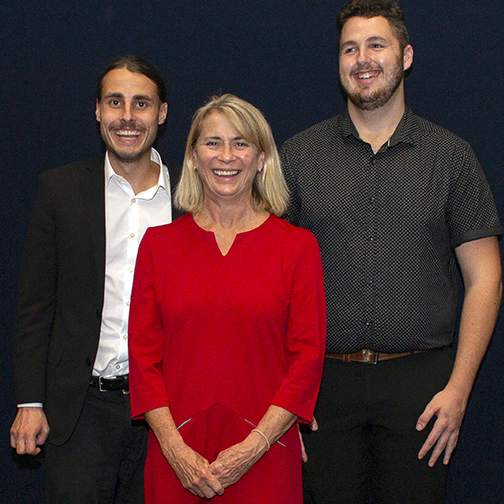Three compelling USC student research projects spanning creative writing, biotechnology and molecular biology have each gained a $4,500 boost from the combined Rotary clubs of the Sunshine Coast.
More than 100 Rotarians from across the region gathered at USC recently to present their annual Rotary Postgraduate Scholarships to Shannon Horsfall of Bellara, Thomas Banks of Golden Beach and Tomas Lang of Sippy Downs.
The scholarships will help progress studies that look set to benefit the aquaculture industry and assist young people in reporting domestic abuse.
The recipients are available for media interviews about the following research projects:
- Shannon Horsfall’s Creative Writing doctoral research, which endeavours to expose the problematic silencing of the child experience of domestic abuse. Shannon is a published author who holds a USC double degree with First Class Honours.
- Thomas Banks’s Science PhD research to ‘silence’ certain genes in rock lobsters, without permanently changing them, to benefit aquaculture. In his first year at USC, Thomas received the Renouf Family Scholarship that was established by former Rotary International President Sir Clem Renouf.
- Tomas Lang’s Science PhD research into the molecular basis of interactions between corals and seaweeds and how these interactions might be affected by climate change. His research in molecular biology could one day be applied to regenerative medicine or restorative aquaculture.
USC Vice-Chancellor and President Professor Helen Bartlett thanked the members of the 17 Rotary clubs of the Sunshine Coast for raising more than $200,0000 since 2001 to support 60 USC postgraduate students.
“Rotary recognises that our Higher Degree by Research students are working at the forefront of their fields and are making inroads into entirely new knowledge,” Professor Bartlett said.
“The work that these students are doing not only brings our regions forward, but also adds to the global pool of scientific and societal understanding across many fields including health, business, education and the environment.”
Media enquiries: Please contact the Media Team media@usc.edu.au

